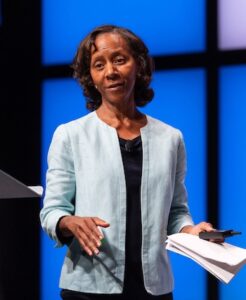
Marian Croak
*Marian Croak was born on May 14, 1955. She is a Black engineer and inventor known for her voice-over IP (VoIP) related inventions.
Dr. Marian Rogers Croak was born and raised in New York City. She credits her lifelong interest in technology to her father. While he did not have formal education beyond elementary school, he built her a chemistry set that began an early exploration of the sciences. Croak grew up entranced by the inner workings of plumbing and electricity. Her career is defined by the desire to fix broken systems, just like the technicians she viewed as a child. Croak got a bachelor's degree from Princeton University in 1977 and a PhD from the University of Southern California in Social Psychology and Quantitative Analysis. Her education led to Bell Labs, where she worked for three decades. She started in Bell's Human Factors division, studying how technology could positively impact human lives.
Croak began working on digital messaging applications to determine if various messaging applications could communicate. This kind of research form of the Internet would not come to fruition until 1983. Bell Labs wanted to send voice, text, and video data digitally. Croak and the rest of her team convinced AT&T to use TCP/IP, which allowed for a standardized way of packaging and communicating information. While at AT&T, Croak and her team advanced Voice over Internet Protocol (VoIP) technologies, converting voice data into digital signals over the Internet rather than using traditional phone lines. Her work has furthered the capabilities of audio and video conferencing.
At AT&T, she patented the technology that allowed cellphone users to donate money to organizations using text messaging. She developed this technology during the aftermath of Hurricane Katrina, revolutionizing how people donate to charitable organizations when a natural disaster occurs. She was inspired to do this after seeing AT&T develop technology that helped American Idol set up a voting system that relied on text messages rather than voice calls in 2003. She received a patent in 2005 for text-based donations to charity, along with co-inventor Hossein Eslambolchi, U.S. Patent 7,715,368 Method and Apparatus for dynamically debiting a donation. This technology enables a network to identify a particular charity, provide the designated funding to the charity, and then have the network service provider bill the original donor.
Through this technology, after the 2010 Haiti earthquake, more than $43 million in donations were collected by relief organizations through donations. She received the 2013 Thomas Edison Patent Award for this technology. As Senior Vice President of Applications and Services Infrastructure at AT&T, she managed over 2,000 engineers and computer scientists responsible for over 500 programs impacting their enterprise and consumer wireline and mobility services. Her responsibilities ranged from product realization and service planning to development and testing. In 2014, she joined Google as a vice president of the engineering group; she expanded what the Internet could do worldwide and increased access to the Internet in the developing world. She created a new center of expertise on Responsible AI focusing on the ethical development of AI within Google Research.
Croak also works on racial justice efforts at Google and continues her goal of encouraging women and young girls in engineering. Croak has over 200 patents, almost half of which are in VoIP. Her inventions lay the foundations for the digital networks we know and use today. She was inducted into the National Inventors Hall of Fame in 2022 for her patent VoIP Technology U.S. Patent No. 7,599,359 Method and apparatus for monitoring end-to-end performance in a network. She was inducted into the National Academy of Engineers and the American Academy of Arts and Sciences in 2022. Because of this, she became one of the first two Black women to be inducted to the NIHF, joining the ranks of 48 other female inductees and 30 other Black inductees.
She is currently a member of the Corporate Advisory Board for the Viterbi School of Engineering at her alma mater, the University of Southern California. Croak is also a former board member for such organizations as the Alliance for Telecommunications Industry Solutions, Catalyst, the Holocaust and Human Rights Museum (New Jersey), and the National Action Council for Minorities in Engineering. She has three grown children.
To become an aerospace engineer
To become a Community and Social Service Health educator